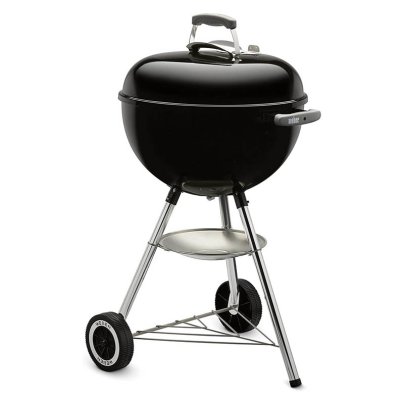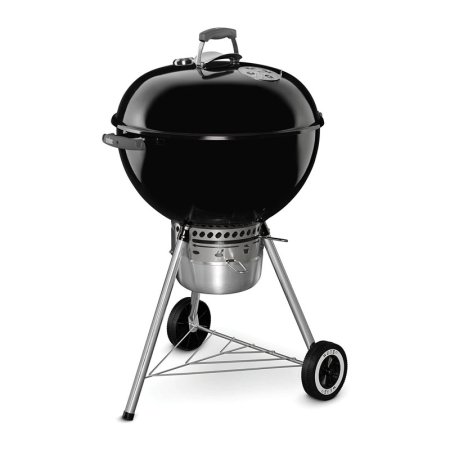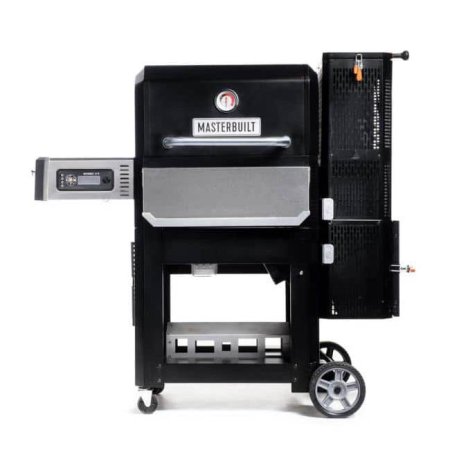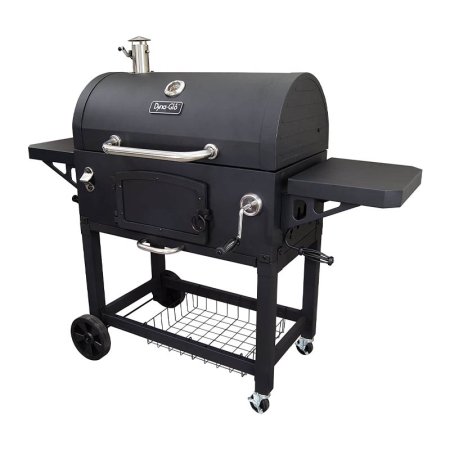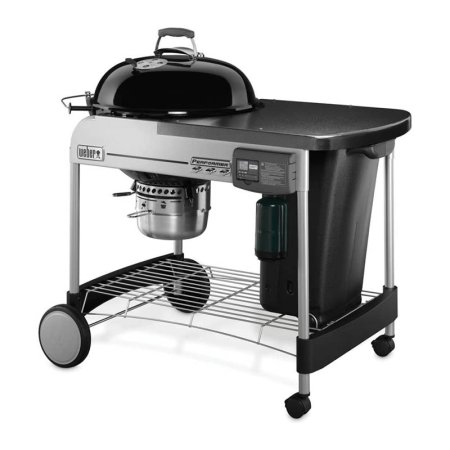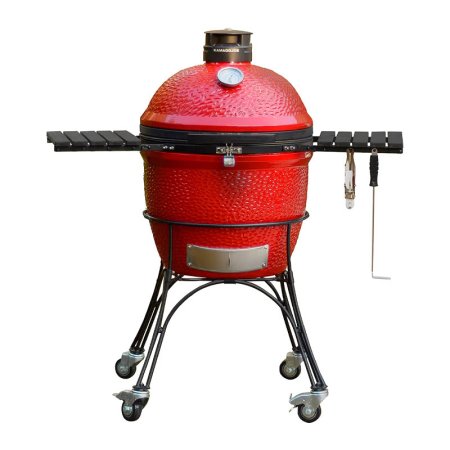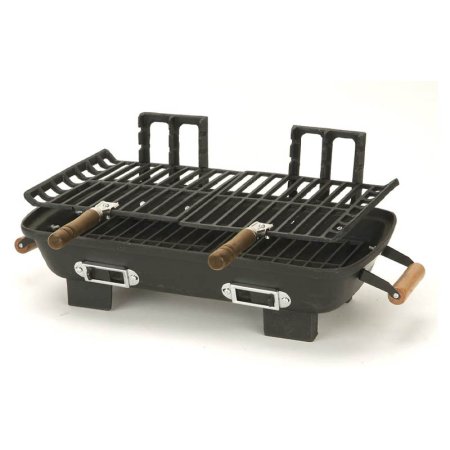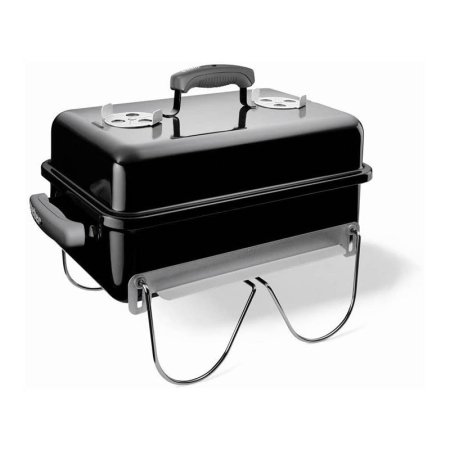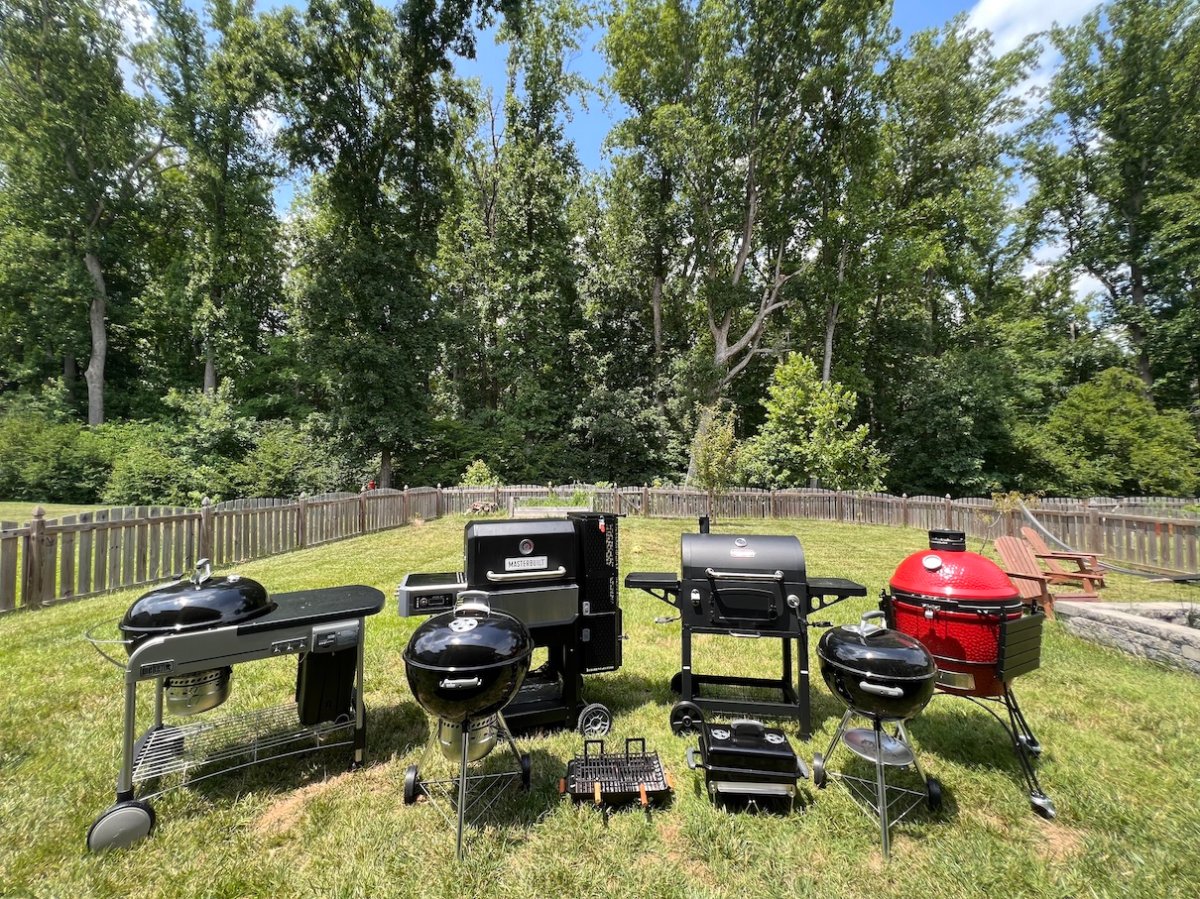
We may earn revenue from the products available on this page and participate in affiliate programs. Learn More ›
Grilling is a cooking practice that dates back thousands of years. Charcoal grills are simple devices, so buying one seems like it would be easy. But while any old grill can cook food, there are significant differences among charcoal grills, and these will affect how you cook meat and vegetables. The right grill can make the difference between steaks that are the perfect pink or medium rare and steaks that have been incinerated. Good grilling that infuses that smoky taste into your food requires the right grill.
The best charcoal grills come with a range of features, including ventilation for heat control, adjustable grates, covers, and even integrated smokers. So before you pull on your BBQ gloves and start cooking, you need to start with the right grill for you. The research and reviews here can help you sort through some of the best charcoal grills on the market today.
- BEST OVERALL: Weber Original Kettle Premium Charcoal Grill
- BEST BANG FOR THE BUCK: Weber Original Kettle 18-Inch Charcoal Grill
- BEST WITH SMOKER: Masterbuilt Gravity Series 800 Charcoal Grill
- BEST LARGE-CAPACITY: Dyna-Glo X-Large Heavy-Duty Charcoal Grill
- BEST CART-STYLE: Weber Performer Deluxe Charcoal Grill
- BEST KAMADO: Kamado Joe Classic Joe Grill – Series II
- BEST HIBACHI: Marsh Allen Cast Iron Hibachi Charcoal Grill
- BEST PORTABLE: Weber Go-Anywhere Charcoal Grill
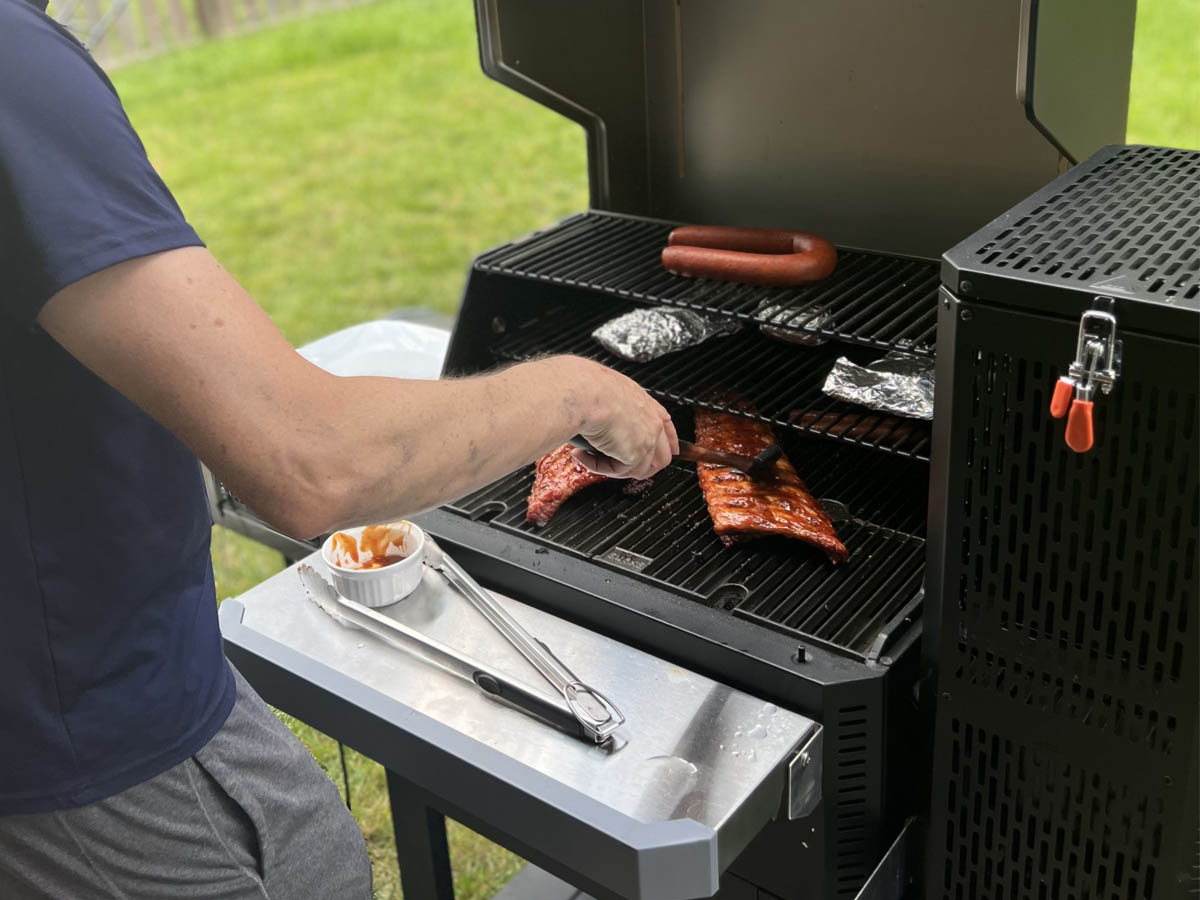
How We Tested the Best Charcoal Grills
We subjected our selection of grills to a rigorous testing process. Using a scoring rubric, we evaluated each grill on a variety of factors, including ease of assembly, ease of cooking, performance, and durability. To ensure fair testing, we grilled boneless chicken and a burger patty on each grill. The burger patty was used to determine the grill’s ability to reach sear-worthy temperatures, while our boneless skinless chicken breast helped us to determine how each grill cooked as well as how easy it was to maintain the temperature with the lid closed. In addition to grilling, we tested any additional features the grill had, including its ability to smoke, any smart- connectivity features, and its ignition systems. Cleanup was also important. While all charcoal grills produce charcoal ash after use, we made note of those models with systems that make them easier to clean beyond the typical, turn-over-and-dump or scoop-and-dump methods of disposing of ash.
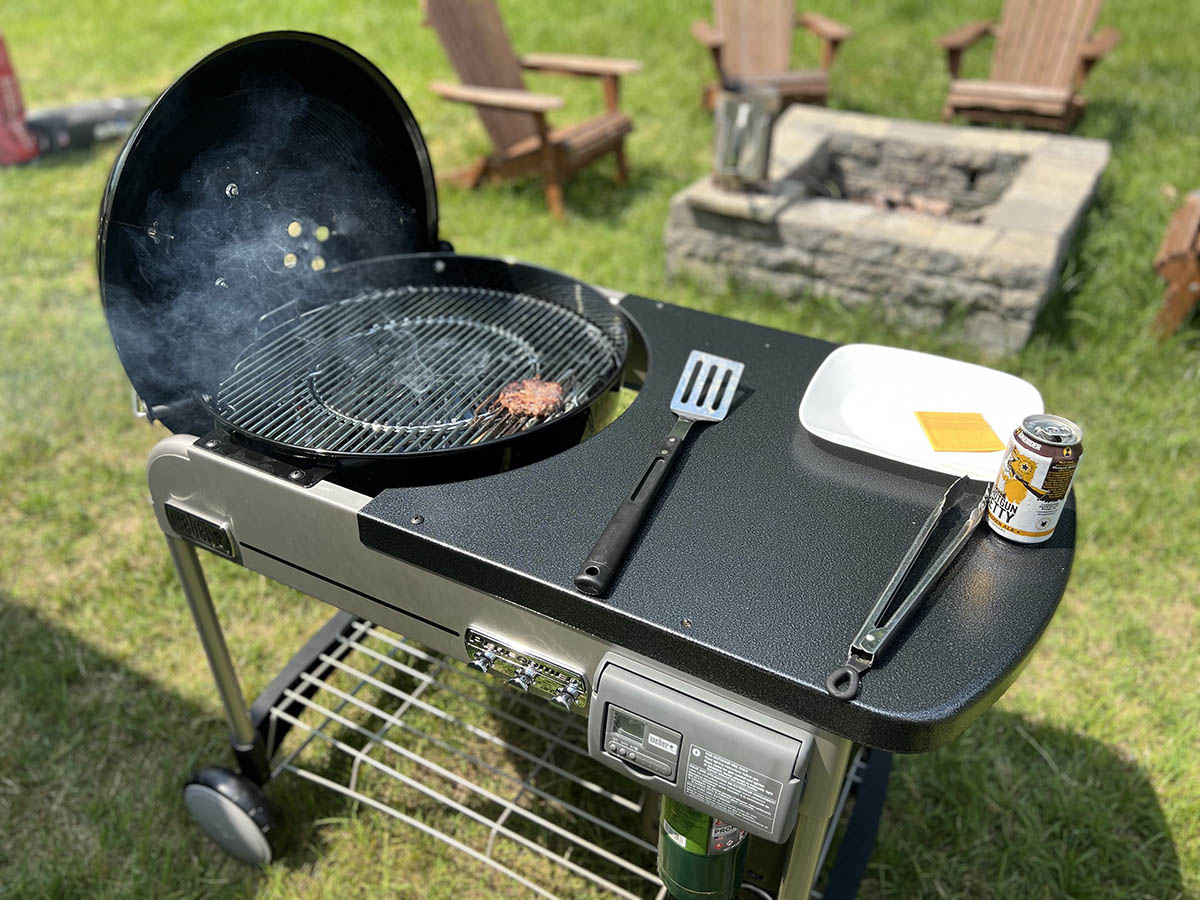
Our Top Picks
This guide rounds up some of the best charcoal grills based on the shopping criteria reviewed above plus quality and price.
Best Overall
Weber Original Kettle Premium Charcoal Grill
Pros
- Reaches high temperature for searing
- Easy-to-clean ash-collection system
- Fairly easy to move around
- Durable construction
Cons
- Can get too hot
Weber invented the kettle charcoal grill some 70 years ago, and it continues to dominate the market with its line of kettle grills. While all of Weber’s kettle grills are indeed impressive, the Weber Premium sets itself apart with a larger cooking surface and well-designed ash management system.
Out of the box, the Weber Premium kettle grill was ready to go in about 30 minutes, a credit to its use of Bilt, a third-party app that provides step-by-step, 3D-animated assembly instructions for a variety of products, including Weber grills.
Once assembled, it was easy to roll the grill into the backyard thanks to its two wheels and a handle mounted to its front.
Weber’s kettle grills are well regarded for evenly heating the cooking surface, and the Premium is a great example of this. Filled to just a third of its capacity, the cooking surface got so hot that we found it difficult to stand in close enough proximity to flip a burger patty, a clear testament to the large vents on its base.
That intense heat made it easy to sear a crust onto the burger, which was done in minutes, but it was more challenging to avoid overcooking. With the lid on and the vents almost fully closed, the lid thermometer still exceeded the maximum 600-degree Fahrenheit reading for a fairly long period, forcing us to wait before throwing our chicken on the grill surface. It’s clear that less is more when it comes to using charcoal in the Weber Premium.
Cooking space and useful additional features set the Premium apart from the standard Weber kettle grill. With its 22-inch cooking grate, it has more cooking surface than Weber’s smaller 18-inch original. We could have easily fit a dozen burgers on the surface.
There were other features only found on the Premium that we liked. A hinged grate makes it easy to add briquettes during longer grilling efforts, while the integrated lid thermometer is useful for monitoring temperature while the lid remains closed. The heat shield under the handle keeps the handle cool as well.
But its ash-control system really makes the Premium shine. Rather than a shallow bowl, the Premium comes equipped with a large-capacity enclosed detachable bowl. That feature, coupled with the ability to push ash into the bowl with the vent lever, makes periodic ash dumping easy.
Read our full review:Weber Original Kettle Premium Charcoal Grill
Product Specs
- Dimensions: 39.5 inches long by 22.5 inches wide by 27 inches deep
- Weight: 32.3 pounds
- Primary cooking surface: 363 square inches
Get the Weber Original Kettle Premium charcoal grill at Amazon, The Home Depot, or Ace Hardware.
Best Bang for the Buck
Weber Original Kettle 18-Inch Charcoal Grill
Pros
- Affordable price for high quality
- Reached high temperatures quickly
- Dual vents allow for temperature control
- Wheels make it easy to maneuver into place
Cons
- Difficult to remove ashtray
For those who don’t mind sacrificing a few nice-to-have features found on Weber’s Premium kettle grill, the company’s original 18-inch model offers nearly the same level of performance at a more affordable price.
The original, like the larger Premium, assembled in less than 30 minutes and comes equipped with two wheels and a handle on the body that make moving it into position on a deck, patio, or lawn fairly easy.
There’s a lot to like about cooking with the Original. The porcelain-coated enamel steel has a solid weather-resistant feel to it. Our coals got very hot, which is a testament to the large vents that the Original has on the underside, allowing for plenty of airflow through the cookbox. We had no problem achieving the sought-after brown grill marks on our burger patty, though that high heat did force us to remain hypervigilant to prevent overcooking our food. As with the Premium, controlling temperature with the lid closed for our chicken breast was a bit more of a challenge. It wasn’t easy to get the grill below 450 degrees Fahrenheit to cook chicken, even with the vents almost fully closed.
The most noticeable difference between the Original and the higher-priced Premium, aside from the smaller cooking surface, is the cleaning. While the vent lever allowed us to guide ash through the vents, the ash pan is significantly smaller than the Premium’s. This not only forces users to empty it more often, but it’s also more awkward to remove and dump out the ash without making a mess. That gripe aside, the Original is an excellent deal for those looking for an affordably priced kettle grill that will last a long time.
Product Specs
- Dimensions: 36 inches long by 23 inches wide by 18.5 inches deep
- Weight: 24 pounds
- Primary cooking surface: 240 square inches
Get the Weber Original Kettle charcoal grill at Amazon, The Home Depot, or Ace Hardware.
Best with Smoker
Masterbuilt Gravity Series 800 Charcoal Grill
Pros
- Design makes smoking easy
- Maintains very consistent temperature even at low heat
- Can be controlled via a smartphone app
- Ample cooking space
Cons
- Doesn’t grill over a direct flame
- Long assembly process
Masterbuilt’s Gravity Series Smoker isn’t for the faint of heart when it comes to assembly. Additionally, its offset heat design may turn off those who like to grill over a direct flame. However, it flat out rocks as a smoker.
While pretty much any full-size grill requires a fairly involved assembly process, Masterbuilt’s Gravity Series 800 took us the longest to build at about 2.5 hours. Though to be fair, the other grills we tested are less complex as they don’t function as digital smokers.
Once assembled, the 800 is imposing, measuring some 55.1 inches wide and 50.9 inches tall. That extra width is due to a large gravity-fed charcoal hopper attached to its side that can hold up to 16 pounds of charcoal.
As a standard barbecue grill, the Masterbuilt certainly does well. It produces enough heat to reach sear levels for burger patty; however, we had a hard time getting past the fact that it wasn’t cooking over an open flame but rather from an indirect heat source. Still, it produced juicy burgers, and the indirect heat was well suited for cooking chicken.
The 800 truly shines as a smoker. Whereas other charcoal smokers require constant fussing with various vents to maintain the right temperature, the Masterbuilt 800 uses a fan controlled by a digital thermostat. In our effort to smoke two racks of ribs, the 800 had no problem cooking slow and low, maintaining a constant temperature within a few degrees of the digital thermostat setting with no need to make any vent adjustment through the roughly 3-hour smoking effort. That feature, plus its ability to hold enough charcoal to last 12 hours, makes it a very low-maintenance charcoal grill.
Special features include jacks for four digital meat thermometers and an app that allows users to control and monitor the 800’s internal temperature while tracking the meat probes. In short, the Masterbuilt is one of the easiest charcoal smokers we’ve ever operated. Its ability to maintain constant cooking temperatures while allowing close monitoring of food temperatures resulted in juicy ribs with a distinct smoke ring that were comparable to—if not better than—what we might find at a good smokehouse.
Product Specs
- Dimensions: 50.9 inches long by 55.1 inches wide by 30.5 inches deep
- Weight: 204.2 pounds
- Primary cooking surface: 800 square inches
Get the Masterbuilt charcoal grill at The Home Depot.
Best Large-Capacity
Dyna-Glo X-Large Heavy-Duty Charcoal Grill
Pros
- Affordable price for size
- Retains heat well
- Easy-to-use vent controls
Cons
- Lower-quality construction
While the Dyna-Glo Charcoal Grill may lag behind other grills when it comes to construction quality, a broad cooking surface, an affordable price, and a few thoughtful design features make it a worthy grill for those looking for a large grill on a small budget.
Out of the box, it was clear that the Dyna-Glo isn’t on par with other pricer brands of charcoal grills. The lid didn’t line up perfectly with the base on one side, and its side vent left gaps that allowed air to pass through them even when they were closed. All these build issues stem from the fact that Dyna-Glo uses a thinner gauge of sheet metal than other grills.
Despite those drawbacks, we found much to like about the Dyna-Glo grill. Its barrel shape and a large primary cooking surface offers 576 square inches of cooking surface. A secondary grilling rack adds another 240 square inches of cooking surface. We also liked how we could easily reach all the grill’s controls while standing in front of it. Turning a crank lowers or raises the charcoal grate, bringing the heat closer to the food for searing or further away for less direct heat. Controls for opening or closing each side vent as well as the smokestack vent on the lid are also in close proximity to the handles, which always remained cool to the touch.
The Dyna-Glo comes equipped with two large side tables, which we found convenient for food that was on deck or coming off the grill. Perhaps most importantly, the Dyna-Glo produces. We were able to get a nice char on our burgers as well as evenly cooked chicken. Those features and its affordable price tag outweigh the build issues that may make the Dyna-Glo less durable.
Product Specs
- Dimensions: 50.98 inches long by 60.79 inches wide by 28.43 inches deep
- Weight: 96 pounds
- Primary cooking surface: 576 square inches
Get the Dyna-Glo charcoal grill at The Home Depot.
Best Cart-Style
Weber Performer Deluxe Charcoal Grill
Pros
- Large amount of prep space
- Gas-powered electric ignition system
- Baskets for indirect heat
Cons
- Large footprint may not suitable for smaller spaces
- Expensive
Weber’s charcoal grills are nearly all a variation on its classic kettle design, and the Performer is no different. It takes the 22-inch Premium kettle grill, lops off the legs, and marries it to a cart to create a rolling outdoor kitchen.
While Weber’s kettle grills are well respected, one drawback is the lack of any sort of prep space. The Performer is an exception. The large cart that supports the grill body is vast compared to the side table on other grills. We found ourselves loading it up with food that was coming on and off the grill with room to spare for a cold beverage or two.
While space may be its biggest advantage, the Weber also includes other features that make it easier to use. The cart sits on two caster and two larger wheels that make pushing the grill across a patio or even through a lawn surprisingly easy.
The Performer is also the only grill with an automatic lighting system that uses a 16-ounce gas canister to ignite charcoal placed in two charcoal baskets. There’s no need for lighter fluid or starters. Just hit the igniter and a gas flame does the job.
As with Weber’s other premium kettle grills, there’s a built-in thermometer on the lid, so cooks can monitor the grill’s internal temperature. Grates allow users to add charcoal in the middle of grilling, and there’s a spacious 363-square-inch cooking surface, an integrated digital timer, and a removable ash catcher that makes cleanup easier.
The Performer also comes with two metal charcoal trays that can be positioned on either side of the grill to create multiple cooking zones, which is a nice feature for cooking chicken over indirect heat. We also used the trays to sear our burgers before finishing them on the cooler part of the grill.
We weren’t as impressed with the charcoal storage bin. While it seems like a nice idea, it’s more challenging to transfer the charcoal from the bin to the grill itself than it is to leave the charcoal in the bag. While we liked the Performer’s prep space, lighting system, and other features, it’s important to note that it’s a big step up in price from Weber’s standard kettle grills.
Product Specs
- Dimensions: 43.5 inches long by 48 inches wide by 30 inches deep
- Weight: 96 pounds
- Primary cooking surface: 363 square inches
Get the Weber Performer Deluxe charcoal grill on Amazon or at The Home Depot.
Best Kamado
Kamado Joe Classic Joe Grill – Series II
Pros
- Can reach high temperatures for searing
- Versatile enough to function as a smoker
- Relatively small footprint
- High-end build quality
Cons
- Expensive
- Exterior stays hot for a long time
Though they’re an investment, ceramic Kamado-style charcoal grills offer tremendous performance and versatility. The Kamado Joe II can reach temperatures exceeding 700 degrees Fahrenheit for searing steaks and also maintain low temperatures for smoking. Fitting the Joe II with ceramic plates can create indirect heat for roasting. There are seven accessories for making wood-fired pizza.
The Joe II, like other Kamado grills, accomplishes all of the above with its thick ceramic construction, which also happens to make it quite heavy. It tips the scales at more than 230 pounds, the bulk of which comes from the single ceramic piece that makes up the grill body.
Needless to say, there is no way to assemble the Kamado Joe alone. Lifting the ceramic grill body and placing it in the wheeled cart that serves as its base required two people. Completing the setup involved installing the curved ceramic pieces that help retain heat and positioning the racks into place, which wasn’t time-consuming and didn’t require any tools.
It takes a little time for the Joe II to get going once it’s lit, but once it does, it produces a high heat over the entirety of its 18-inch cooking surface that is simply more intense than that of the other charcoal grills we tested. We had no problem achieving beautiful sear marks on our burger patty. The Kamado Joe is equipped with two vents—one at the base and one on the top—that allow users to adjust the temperature when the lid is closed.
Given that the lid creates a tight seal, the vents are crucial to managing temperature, and they work well. Once decked out for indirect heating, the Joe II did a great job reaching temperatures below 450 degrees Fahrenheit, which are necessary for cooking chicken without burning it on the outside.
Operating the Kamado’s lid is also easy thanks to its Air Lift Hinge, and a tray at the bottom of the grill made it easy to dispose of ash. One important note: When the Joe II gets hot, it stays hot for a long time. Hours after we had finished testing the Joe and the coals had been snuffed out, the exterior was still too hot to touch. While this isn’t a big deal, it may be a concern for those with young children or curious dogs.
Yes, the Kamado comes with a very high price tag, but it offers exceptional performance, which makes it worth it for serious outdoor cooking enthusiasts.
Read our full review:Kamado Joe Classic Joe Grill – Series IIProduct Specs
- Dimensions: 48.5 inches long by 46.5 inches wide by 28 inches deep
- Weight: 233 pounds
- Primary cooking surface: 250 square inches
Get the Kamado Joe charcoal grill on Amazon or at The Home Depot.
Best Hibachi
Marsh Allen Cast Iron Hibachi Charcoal Grill
Pros
- Solid cast-iron construction
- Multiple grate heights
- Requires very little charcoal to use
Cons
- Limited cooking space
- Feet don’t provide enough clearance for tabletop use
Though the Marsh Allen Cast Iron Hibachi Charcoal Grill may be space constrained, at less than 160 square inches, it performs surprisingly well. This makes it a great buy for those who may not have much room for grilling or who want a simple grill to take to the beach or a park.
The Marsh Allen Hibachi Grill may be small, but it feels well made. The grates at the base are heavy cast iron, giving it a sturdy feel. It also has the ability to get surprisingly hot. It only took a handful of hardwood charcoal to create ample heat for searing a burger patty. It also did surprisingly well with our grilled chicken kabob, though we did have to be diligent about rotating it to get an even cook since the grill, like traditional hibachi grills, lacks a lid.
With its three height positions, it was easy to make adjustments to achieve either a sear or a lower cooking temperature. And, since the grates can be set to different heights, we could actually create two, albeit small, cooking zones.
One flaw with the Marsh Allen is the height of the feet. We used it on a wooden tabletop and ended up searing a burn mark onto the table’s surface because the feet didn’t provide enough clearance. A possible fix for this issue might be to place a mat underneath the grill to serve as an insulator. Despite this flaw, the Marsh Allen Cast Iron Hibachi Charcoal Grill cooks surprisingly well for its compact size, making it an ideal grill for small meals for one or two.
Product Specs
- Dimensions: 14 inches long by 22 inches wide by 3 inches deep
- Weight: 16.3 pounds
- Primary cooking surface: 157 square inches
Get the Marsh Allen charcoal grill at Ace Hardware or at Target.
Best Portable
Weber Go-Anywhere Charcoal Grill
Pros
- Light weight, collapsible legs, and locking lid for easy transport
- 4 vents make it simple to manage heat output
- Surprising amount of cooking surface
- Requires very little charcoal
Cons
- Challenging to cook at lower temps because of grill’s design
With its simple yet clever design, Weber’s aptly named Go-Anywhere grill is so portable and lightweight that it’s easy to tote virtually anywhere, all while performing nearly as well as its full-size cousins.
By utilizing a box-shaped design, the Go-Anywhere is a departure from the family of other Weber charcoal grills that use the kettle shape the brand is famous for. First and foremost, this shape makes the Go-Anywhere quite portable. At just 21 inches wide and 12.25 inches deep, it’s compact.
The Go-Anywhere’s wire legs wrap up and over the grill’s lid and snap into place, locking the lid to the body, which allows users to carry it like a small piece of luggage via the lid handle.
Despite its compact size, the Go-Anywhere grill performs quite well. Its 160 square inches of cooking surface is larger than average for portable grills and offers enough space to fit six burgers or several kabobs. Its small size also means we needed very little charcoal to fill the grill. The grate is in close proximity to the hot coals, making searing easy. Although it got hot enough to sear a nice crust on our burger patty, the legs were long enough to ensure that the grill was never in danger of scorching the surface of our table.
Weber equips most of its kettle grills with a vent on the bottom and one on the top. The box-shaped Go-Anywhere trumps that with four separate vents: two circular baffles on the top and two long vents that run along the grill’s front and back. This design creates plenty of airflow to keep the coals hot while at the same time giving the user multiple ways to control the grill’s internal temperature when the lid is on.
The Go-Anywhere’s compact size and light weight, coupled with its great performance, make it an ideal portable grill.
Product Specs
- Dimensions: 14.5 inches tall by 21 inches wide by 12.25 inches deep
- Weight: 14 pounds
- Primary cooking surface: 160 square inches
Get the Weber Go-Anywhere charcoal grill on Amazon or at The Home Depot.
What to Consider When Choosing the Best Charcoal Grill
Here are some factors to consider when shopping for a charcoal grill.
Type
There are eight basic types of charcoal grills: kettle, barrel, ceramic, kamado, hibachi, cart, portable, and built-in models.
- Kettle charcoal grills are the classic, rounded grill. They have a steel chamber on legs that holds the charcoal and cooking grates. They usually have a lid and chamber with vents to control airflow into the grill.
- Barrel charcoal grills look like a steel barrel sliced in half. The halves are hinged so the grill has a lid, and a grate sits in the bottom of the chamber. It has top and bottom vents and may also have a chimney.
- Kamado charcoal grills, also known as ceramic grills or egg-shaped cookers, take longer to heat up but will hold and radiate heat longer than a standard steel grill. They have a narrow egg shape that reduces airflow on the food so steaks stay moist while cooking.
- Hibachi charcoal grills are small and portable with a cast-iron grate suspended over a metal chamber that holds charcoal. Hibachis don’t have a lid, and while some have ventilation in the bottom for heat control, this isn’t a standard feature.
- Cart charcoal grills have various chamber shapes and grid patterns, but their defining feature is at least one pair of wheels that makes them very portable. Users can roll them anywhere they’d like to cook out.
- Portable charcoal grills usually have a smaller cooking surface, folding legs, a carrying handle, built-in tabletop stand, and a compact size. Designed for camping or tailgating, they tend to be smaller and even more portable than cart grills.
- Built-in charcoal grills are fixtures built to remain outdoors year-round. They can be made of bricks, mortar, concrete, cast iron, tile, and steel. A built-in grill requires a significant time and money commitment; however, once the grill is built, it will last much longer than a standard charcoal grill.
Size and Weight
Consider how and where the grill will be used when deciding on the best charcoal grill. If the grill will be stored indoors over the winter or taken on camping trips, one that is small and lightweight would be best. If users will regularly be cooking for a crowd, the best charcoal grill will be one with a lot of surface area for cooking food.
Cooking Surface
The cooking surface of a charcoal grill is usually one or two metal grates made of cast iron or stainless steel. The cooking surface may be completely flat, or it can have multiple tiers so that users can grill at low and high heat simultaneously. The second tier can also be used for keeping food warm while the rest of the food cooks.
Heat Control and Airflow
The key to cooking food properly on a charcoal grill is controlling the temperature, which is accomplished by adjusting the amount of oxygen the flames get. Vents in the hood and chamber let the user control the airflow. Users can manage the heat by controlling the distance between the food and the flames. To do this, raise or lower the charcoal and cooking grates.
Ventilation
Air vents are the temperature control on a charcoal grill. These vents are on the bottom or top of the grill and control airflow on the food and the flames. More air makes the fire burn hotter, and less air lowers the heat. Ventilation in the bottom of the grill pulls in oxygen to keep the charcoal hot, while vents in the top of the grill pull heated air out and away from the food. Closing the top vents traps smoke inside the grill, giving food that wonderful smoky flavor.
Additional Features
Some charcoal grills have a simple design, while others have premium features, such as:
- Digital temperature controls, which let cooks set the temperature. The grill makes the necessary adjustments to its ventilation to maintain the temperature, taking the guesswork out of heat control.
- An ignition switch, so matches and lighters are not necessary to ignite the charcoal.
- Smokers that enable users to cook food slowly and at a lower heat. Smoking is a different technique from grilling, which is about high heat and fast cooking. Some charcoal grills have a separate chamber for smoking food or a main chamber designed to double as a smoker.
Ease of Cleaning
Grease and charred pieces of food stick to the grill, and the chamber, ash basket, or drawer fills up with ashes after each cooking session. Some charcoal grill grates can be run through the dishwasher, but it’s usually best to hand-wash and dry them along with the chamber. It’s easier to get ashes out of a grill if there’s a basket or drawer that can be pulled out.
FAQs
Here are answers to some of the most commonly asked questions about charcoal grills.
Q. Does charcoal add flavor?
Yes, charcoal adds flavor to food, and if you pick the right charcoal for your grill, you can give food a rich, deep taste.
Q. Is the smoke from charcoal dangerous?
Smoke of any kind is dangerous if inhaled in large quantities. Some charcoal smoke can contain hazardous byproducts, depending on the type and quality of the charcoal you use.
Q. What can you make on a charcoal grill?
You can grab your grill tongs and make burgers, hot dogs, sausages, steaks, roasts, chicken, turkey, kabobs, mushrooms, onions, and many more items.
Q. How often do you need to clean a charcoal grill?
Deep clean your grill at least once every 2 months using a grill cleaner. You should also clean food debris from the cooking surface with a grill brush before you cook.
Q. How long do charcoal grills last?
The average charcoal grill will last about 10 years, provided it’s maintained and protected with a grill cover when not in use.
Meet the Tester
Tony Carrick is a freelance writer specializing in home improvement, landscaping, technology, home security, and design. His articles have been featured on such sites as Angi, Popular Science, Futurism, 360 Reviews by U.S. News & World Report, Domino, and more. Carrick has conducted rigorous product testing on everything from power tools to home security systems to backyard grills. With each review, his goal is to help readers determine whether a product meets their needs and if it is or isn’t worth its price tag.
Additional research provided by Timothy Dale.

